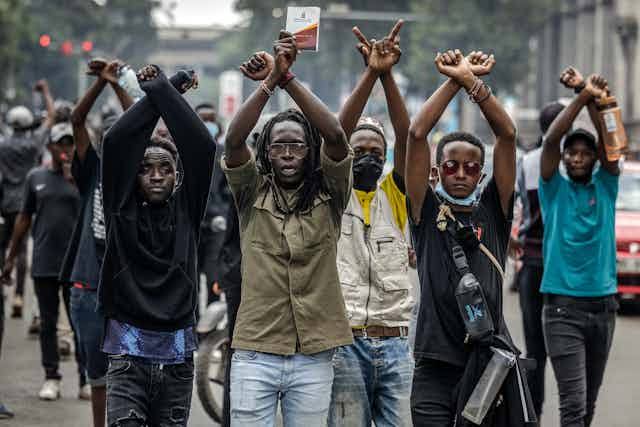A nation’s soul is the invisible force that shapes its identity, values and collective spirit. It represents the shared ideals, aspirations and cultural heritage that bind citizens together, guiding them through challenges, progress and even crises. However, the soul of a nation is fragile.
Throughout history, many societies have witnessed the erosion or destruction of their national souls, often as a result of deliberate actions or cumulative neglect. Once a society’s national soul is weakened or destroyed, it faces an existential crisis, marked by confusion, disillusionment and loss of purpose.
Of many others here are three ways through which a society can destroy its soul.

A group of Gen Z protesters matching along streets of Nairobi. Photo: Tuko Source: Facebook
The first one is blind ethnic nationalism pursued by certain leaders for selfish personal political gain. A society that fosters division—be it along ethnic, religious, regional or political lines—undermines unity.
Tribalism and sectarianism easily destroy the essential fabric that holds a nation together, often leading to conflict, hatred and more often than not, violence.
When political leaders manipulate ethnic divisions for their own gain, they not only create discord but also disempower citizens, reducing them to mere sirens of their respective communities.
This practice erodes the spirit of inclusion and fairness, replacing it with a fragmented society where citizens see each other primarily through the lens of difference rather than shared humanity.

A Kenyan carrying a Kenyan flag during past demos
Kenya has sometimes struggled with ethnic divisions, often exacerbated by political manipulation by individuals with a limited view of how nations are made great courtesy of meritocracy and inclusion. Such is what happened in 2007 when post-election violence left thousands dead and displaced.
Secondly, a nation’s soul is intrinsically tied to its culture—its history, traditions, art, language and collective memory. When a society loses touch with its cultural roots or actively works to erase or suppress them, it loses a key element of its national soul. A shared cultural heritage is the foundation of pride, belonging, and continuity, giving citizens a sense of identity and purpose.
This destruction of cultural heritage can occur in many ways—through the dominance of foreign cultures or the abandonment of traditional values. Societies that lose their cultural identity often find themselves adrift, disconnected from their history and unable to form a coherent vision for the future.

Thirdly, a nation’s soul can be destroyed by systemic inequality—the failure to ensure that all citizens have equal access to opportunities, resources and justice.
This is where the ideology of the Bottom-up Economic Transformation Agenda kicks in. When large sections of society are excluded from economic, educational or social opportunities, resentment grows. The belief that some individuals or groups are more deserving of success or rights than others is a dangerous myth that eats away at the moral core of a society.
The lack of opportunity fuels disillusionment, particularly among the youth, who may begin to question the value of their country. When opportunities are monopolized by elites, or when the system is rigged in favour of certain groups, the broader population loses faith in the principles of fairness and justice.

Protesters March towards Parliament buildings on June 2025. Photo: Nation Source: Facebook
This creates an environment of despair, in which people feel disconnected from the national project and are less likely to contribute to its success.
A nation’s soul is not a static entity. It evolves with changing times but it also requires a steady foundation based on moral imperatives that are shared by an entire citizenry. It requires constant care, reflection and regular renewal.
The destruction of a society’s national soul can occur through many different means—corruption, division, injustice, cultural erosion and systemic inequality. These forces can slowly eat away at the core of a nation, leaving behind a fragmented and disillusioned society that struggles to define itself.
To protect and nurture a nation’s soul, it is essential for citizens and leaders to uphold values like justice, integrity and inclusivity. A nation that is united in its pursuit of fairness, opportunity and cultural pride can withstand many pressures.
Only by investing in the collective good and fostering an environment of trust and hope can a society preserve and strengthen its national soul. When this soul is nurtured, it becomes the source of resilience, unity and a bright future for all citizens.
The author, Billy Gochohi, is an aspiring politician who currently works for a Nairobi-based international organisation that supports small-scale farmers undertaking transformative farming projects in East Africa.



